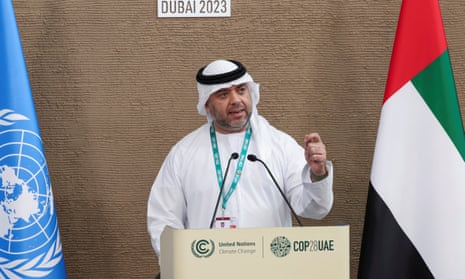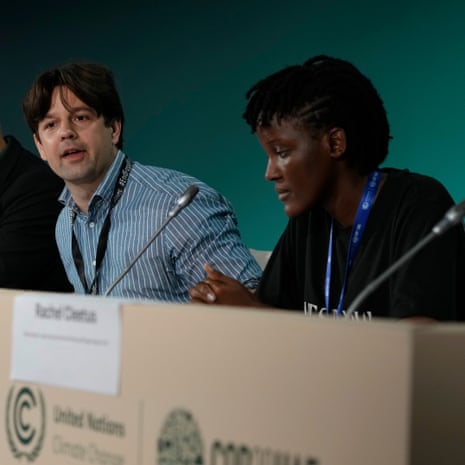Exhausted delegates get ready as negotiations overrun
Patrick Greenfield
Officially, Cop28 wraps up at 11am local time, which is in half an hour. There is no chance of that happening. Expo City is a ghost town this morning. The long queues, packed metro carriages and lengthy security checks are over.
The venue will soon start closing up after hosting the largest climate summit in history. A few people are wandering around the site in the morning haze, but most delegates are likely still in bed, exhausted after negotiations went on into the early hours.
What should we expect today?
Once ministers and their teams are out of bed, attention will turn to another draft of the text that the UAE presidency is preparing right now, although we might be waiting until the afternoon for it. Once published, we will see the same burst of reaction from delegates to the draft, and negotiations are likely to become increasingly fraught.
Yesterday saw strong opposition from the Pacific states, the EU and many others over the failure of the text to include language on phasing out of fossil fuels, something that is crucial for keeping 1.5C alive.
Cedric Schuster, of Samoa, chair of the Alliance of Small Island States, said: “We will not sign our death certificate. We cannot sign on to text that does not have strong commitments on phasing out fossil fuels.”
There are fears that countries like Saudi Arabia and other petrostates could seek to weaken the language further on fossil fuels.
If you want to catch up on where we are, yesterday’s wrap with my colleagues Fiona Harvey, Nina Lakhani, Adam Morton and Damian Carrington is a good place to start.
Key events
Indigenous and Global South campaigners call out rich country ‘hypocrisy’
Nina Lakhani
Experts from Global South and Indigenous communities have described the Global Stocktake and the state of the negotiations as a “dark day” at this year’s last press briefing by the Global Campaign for Climate Justice.
“I come from the belly of the beast. Every year we are faced with major wildfires because the United States fails to reduce emissions at source, they fail to keep [fossil fuels] in the ground when the science is clear,” said Thomas Joseph, from a village in the Six Rivers National Forest of Northern California that has been heavily impacted by the fossil fuel industry. “We have lost control of our government because of the influence of the fossil fuel industry. And that’s what’s going on here today with Cop28…there is no clear pathway forward that’s going to reduce emissions at source and keep us below 1.5C and we continue to implement false solutions, dangerous distractions that put our communities, primarily Indigenous people, at risk.”
Meena Raman, a climate policy expert at her 16th Cop with the Third World Network, said: “The global stocktake has been full of dishonesty and hypocrisy from the Global North, especially the US and ‘umbrella’ group of countries, who are suddenly claiming to be climate champions talking about the 1.5C north star while refusing to talk about their historical emissions and historical responsibility. This is a super red line for the United States. They don’t want to talk about equity, and insist that the text refers to all parties without any differentiation”.
“For people like me who have been following these Cops, their words really ring hollow… because they are setting up the developing countries for failure so they can blame [them] and show themselves as climate champions even as they are expanding fossil fuel production and consumption… this is hypocrisy, it’s climate colonialism, and climate injustice.”
Lidy Nacpil, director of the Asian Peoples’ Movement on Debt and Development, said: “So much of the global south already has extreme energy poverty and the situation will get worse if we’re talking about fossil fuels without talking about finance. It makes us sick when we hear them, because it is so hypocritical that they’re actually expanding their fossil fuel production and consumption and it’s so shameless. That they’re calling for ambition without talking about the delivery of their obligations to provide their fair share of the finance, which is their obligation. We’re not asking for help.”
She added: “They are throwing us some peanuts in the just transition package but without discussion of climate finance this is just going to be all rhetoric. The only climate finance “flowing” is mostly in the form of loans which is going to end up just impoverishing us in the South even more. For us this is a dark day.”
Money has been at the heart of Cop28, both in the negotiations and the announcements that governments and businesses have made on the sidelines. As the summit enters its final hours, here are some key financial takeaways from analysts and campaigners.
“This Cop has set several finance records,” said Joe Thwaites, of the Natural Resources Defense Council. “New pledges to the Green Climate Fund have taken its replenishment to $12.8bn. The newly minted fund to address loss and damages has raised $655.9m, the fastest a UN climate fund has ever been capitalised. But there are concerns that adaptation finance is being ignored and overall commitments at Cop have been disappointing. Rich countries must step up and contribute more if they want to dispel the notion that climate finance commitments are merely moving existing pots of money around.”
Emily Wilkinson, of the thinktank ODI, said: “On the one hand, it’s good the loss and damage fund got off the ground at Cop28, given the opposition from some nations to the idea of compensating countries for historic emissions. However, we need the fund to go further, faster. In the last 22 years extreme weather events have cost small island states alone $105bn, of which $38.4bn can be attributed to climate change. By comparison, there is now around $700m pledged to the fund – just a small fraction of the losses developing countries face as a result of climate change every year – even as anticipated costs are ramping up.”
Fadhel Kaboub, of Power Shift Africa, said: “Climate finance is actually a debt owed by the historic polluters of the global north to countries on the frontlines of climate change. The global north is in default and is refusing to pay its debt. At the end of Cop28 we are nowhere near reaching the trillions global south countries need in transformative grant-based investment and transfer of technology for climate by 2030.”
Sandra Guzman, of the Climate Finance Group for Latin America and the Caribbean (GFLAC), said: “The pledges made at Cop28 for the loss and damage Fund, the Green Climate Fund and other commitments are a positive signal, but this signal won’t be transformative if there is not a predictable plan to transfer them, in an adequate, transparent and equitable way, avoiding debt and making them accessible for the most vulnerable countries.”
The Kenyan climate activist and podcast host Abigael Kima said: “We are on the frontlines of the climate emergency. As the negotiations wrap up here in Dubai, our crops are failing, flash flooding is devastating communities, and conflicts are raging with climate change as an underlying cause. We need world leaders to make strong finance commitments now to help developing countries adapt and transform their economies and societies for a warming future.”

Damian Carrington
With little sign of agreement on the final scheduled day of Cop28, the pressure is intense on the Cop president, Sultan Al Jaber, to bring the 198 countries to an ambitious final deal. One of the few people who has been in the same position is Sir Alok Sharma, who was president of Cop26 in Glasgow, and he spoke to BBC Radio 4 today. He said he would still be trying to get the phrase “phase out of fossil fuel” back into the final text, after it was removed in the draft released on Monday. (There’s more on why “phase out” matters so much here).
“There is still an opportunity to get a historic outcome, the presidency and other countries should not give up. We are literally fighting for the future of our children’s lives.”
“The science tells us we need strong and clear language on fossil fuel phase out. At Cop26, we had a great deal to deal with in the final few hours, but still managed to broker a deal at the last minute. We managed for the first time to get language on fossil fuels, on the phase down of coal.”
“The UAE itself has faced questions going into the Cop [over its own oil and gas expansion plans and more] but actually they had a good first week. But, let’s not kid ourselves that there hasn’t been a big pushback from some vested interests against a fossil fuel phase out – saw that in the letter from OPEC. This is the point of the negotiations where the rubber absolutely hits the road and is an opportunity for the Presidency to bring countries together and broker an ambitious outcome.
“I would say to all the countries who are opposing [a phase out], please think about what is at stake. 2023 was the hottest year on record and we’re seeing more frequent and ferocious climate events around the world. Genuinely I believe that we’re in the last chance saloon to save our children’s futures.”
“These countries need to remind themselves that climate change does not recognise borders. What happens in one country happens ultimately everywhere else, including in the fossil fuel producing countries.”
Nina Lakhani
Zambia’s environment minister, Collins Nzovu, speaking on behalf of the African group at Cop28, has called for more fairness in cutting emissions. “Africa is in support of limiting warming to 1.5C. However, this should be based on differentiated pathways where African countries close the supply gap, rather than developed countries continuing to issue exploration licenses.”
He said an outcome on the Global Goal on Adaptation (GGA) was the group’s key demand. “We will not agree on anything here unless Africa’s top priorities are met, which to us is a GGA framework. If we are serious about saving lives, livelihoods and protecting ecosystems then the GGA framework must have ambitious, time-bound targets with clear means of support for implementation.”
Nzovu added that the agreement should recognise “the full right” for Africa to exploit its natural resources sustainably. “Africa’s cumulative historical emissions are a paltry 3% of the global total; current emissions from [its] energy and industrialised sector are also an inconsequential 3% for a continent of over 50 countries and 1.5 billion people.”

Adam Morton
While Cop28 waits for new text, the summit director general, Majid Al Suwaidi, has given a press conference to defend the United Arab Emirates’ presidency.
His argument in short: this is the way things were always expected to go, and it’s now up to the nearly 200 countries at the summit to come up with an ambitious agreement, not us.
“We’re facing the most demanding Cop agenda of all time, and what we are seeing right now is everybody working through that agenda. All Cops are challenging, but in this Cop we’re trying to do something that has never been done before. Something historic. We are trying to agree on a comprehensive plan to close the gaps between where the world is and where it needs to be to keep 1.5 degrees within reach.”

Al Suwaidi conceded many issues remained open and that “lots of parties” felt the text “didn’t fully address their concerns”.
“We expected that. In fact, we wanted the text to spark conversations. And that’s what’s happened. What we have seen since is that the parties have deeply held and deeply split views, especially on the language around fossil fuels. It’s important to be clear on something: the text we released was the starting point for discussions. Again, this is entirely normal for a consensus-based process.
“When we released it, we knew opinions were polarised. But what we didn’t know was where each country’s red lines were. By releasing our first draft of the text, we got parties to come to us quickly with those red lines. We spent last night talking, taking in that feedback. And that has put us in a position to draft a new text. The text includes all the elements we need for a comprehensive plan to 2030 … but this is a process of the parties … and while the presidency can guide, direct and encourage, the level of ambition is for the parties to agree.”
The question of fairness is at the heart of the impasse at Cop28, said Mohamed Adow, of the climate thinktank Power Shift Africa. “It’s not fair that Congo & Canada must phase out fossil fuels at the same rate. If we want agreement here we should agree to this,” he posted on X.
Adow said rich historic polluters should go first, then middle-income nations such as those in the Gulf, followed by poorer countries. “Developed countries want to treat all countries as if they are the same, failing to acknowledge historic responsibility & different capacities as well as the need for proper funding & technology transfer needed to facilitate the transition.”
It’s only right that rich historic polluters like the US, UK & Norway go first, then middle income nations like those in the Gulf with poorer developing countries after that. It’s not fair that Congo & Canada must phase out fossil fuels at the same rate. If we want agreement here…
— Mohamed Adow (@mohadow) December 12, 2023
He criticised parts of the text and praised others. “We’re on the cusp of a historic outcome in Dubai. But only if we see the potential oasis from the Dubai desert.”

Fiona Harvey
Governments must start to distinguish between the good subsidies they need to fight the climate crisis and the bad ones that are increasing greenhouse gas emissions, the director general of the World Trade Organization has said.
Subsidies and other incentives to burn fossil fuels and encourage poor agricultural practices, amounting to about $1.7tn a year, are distorting world trade and hampering the fight against climate breakdown, Ngozi Okonjo-Iweala told the Guardian.
“Can you imagine if we said we are going to repurpose those subsidies into other friendly subsidies, like for research and innovation?” she said. “I don’t mind that kind of subsidy.”
She gave the example of clean cooking stoves in the developing world. Instead of subsidising fossil fuels, governments could subsidise clean stoves that use solar power or electricity instead of burning wood. “These kinds of subsidies, no one would be against,” she said.
Developed countries devote more money to fossil fuel subsidies than the poor world, so if they reduced those emissions-increasing subsidies, they could free up cash for the poor world, to pay into climate finance such as the loss and damage fund for poor and vulnerable countries, she said.
She also urged countries to bring their trade policy in line with the goal of limiting global temperature rises to 1.5C (2.7F) above pre-industrial levels. “Countries need to review the import tariff regimes to make sure they’re not charging less for polluting items and charging more for the green items,” she said. “At the WTO, we’ve noticed that import tariffs in many countries on renewables are on average higher than tariffs for fossil fuel goods.”
For instance, she said, in many countries the tariffs on imports of secondhand petrol or diesel cars are lower than those on hybrid or electric vehicles. “So you’re disincentivising the very thing that will help you get to net zero,” she said.
“Trade is an important and positive force the for the net zero transition,” she said. “But it’s not being paid attention to as a positive force.”
Read the full story:
UK: Cop28 draft ‘disappointing and does not go far enough’
The UK has added its voice to those of countries criticising the draft text released yesterday. A government spokesperson said: “This draft is disappointing and does not go far enough. The UK position is clear – there must be a phase-out of unabated fossil fuels to meet our climate goals.”
The UK, the fourth biggest historical carbon polluter, is among several rich countries continuing to build infrastructure to dig up more oil and gas while it pushes for a phase-out of fossil fuels at climate summits. The International Energy Agency warned in 2021 that there should be no new oil and gas fields in its roadmap to reaching net zero emissions by 2050 – a key target to prevent the planet from heating by 1.5C above pre-industrial temperatures by the end of the century.
The spokesperson said: “The UK is working with all parties and will continue to push for an ambitious outcome at Cop28 that keeps 1.5C in reach.”
Why are delegates angry at the Cop28 draft agreement text?

Adam Morton
Tuesday morning at Cop28 and we’re back in a waiting game. Heads of delegation met until the early hours, mostly expressing their deep unhappiness with the draft text produced by the summit presidency late Monday afternoon.
The scheduled end of the two-week conference has come and gone – that was 11am local – and as yet there is no new text to replace the document from yesterday. Anybody who says they know when this will end is guessing.
The text released by the Cop president, Sultan Al Jaber, drew ire from multiple directions. Much of the focus has been on paragraph 39, which covers energy and the future of fossil fuels. The good: it references the need to reduce their consumption and production. The bad: what sits around that.
The section is basically a dot-point list of things countries “could” do. Proposed language to phase fossil fuels out or down – the argument at the heart of so much of the talks – is gone even as an option.
There is instead a repeat of previous year’s wording to rapidly phase down “unabated” coal – a word choice that leaves open the option of continuing with “abated” coal. Abatement is referenced frequently, but not defined. Oil and gas are not explicitly mentioned at all.
Many countries speaking at a session overnight argued the section lacks the urgency and ambition needed to deliver on what the president has called his “north star” – keeping 1.5C of heating within reach. For example, the mention of the consumption and production of fossil fuels says they could be reduced “in a just, orderly and equitable manner so as to achieve net zero by, before, or around 2050 in keeping with the science”. This suggests that fossil fuels could still be being used after 2050 and justified by an unlimited amount of problematic offsets – which definitely isn’t what the science demands.
The section also leans on the inclusion of “carbon capture, utilisation and storage” – an underperforming technology that has failed to deliver on a commercial scale despite receiving billions in support. The celebrated goal of tripling global renewable energy and doubling energy efficiency is included, but there is no reference to the financial support needed to help developing countries get there.
And this is just the paragraph of the text that has received the most attention. Climate adaptation is the other major challenge – there is still no clear view on how it will be financed.
There are also a range of technical issues that remain unresolved, notably a fraught debate over the regulation of carbon markets, where the US has been accused of trying to force through an agreement with weak rules and lacking in transparency.
To state the obvious: there is a long way to go as we drift into overtime.

Patrick Greenfield

The Ugandan activist Vanessa Nakate has said the climate crisis is not some vague, distant threat but something that is already killing people and taking away hope from communities.
“A lot has been said about the text,” she said. “What I will say is that what is happening here is unacceptable. What is happening is unjust. What is happening is unfair, especially for the communities on the front line. If we do not address the root cause of the climate crisis, everything else is pointless.”

Patrick Greenfield
While many countries are speaking out about yesterday’s draft text, some are saying silent. Saudi Arabia is among those who have not commented publicly so far. The Guardian visited the kingdom’s offices on Tuesday morning, which are spread across two buildings at Cop28.
Nobody was available to speak to the media and it is understood that the Saudi delegation was up late, like many others. We will keep trying to get their reaction today.
India, too, seems not yet to have commented.
Campaigners warn historic loss and damage agreement still lacking
Nina Lakhani
Once upon a time, 12 long days ago, we were celebrating the establishment of the loss and damage fund – a historic agreement that has so far generated almost $800m in pledges. But experts warned that the job was far from done, and that key issues needed to be addressed in the global stocktake to facilitate the fund’s future success. Alas, the draft text failed to deliver on a number of fronts, according to loss and damage followers, including:
-
Scale: there is no mention of how much money is required to cover the costs of irreversible loss and damage, which already stand at about $400bn a year – developing countries pushed for a floor of $100bn a year but didn’t even get that.
-
Siloed: Loss and damage is missing from the preamble, finance, cross-cutting and way forward sections; the specific agenda item is also gone. Instead, loss and damage is relegated to its own silo or section, with no recognition of the links between mitigation, adaptation, finance more broadly and loss and damage.
-
Responsibility: Developed countries should be funding loss and damage but the language is wishy-washy and only “urges” them to provide support
-
Missing data: A loss and damage gap report is vital so that there is broad and agreed understanding of what funding is required – but that’s been watered down to a synthesis report based on national assessments.
Julie-Anne Richards, of the Loss and Damage Collaboration, said: “The presidency and developed countries clearly think they have ticked the loss and damage box at this Cop … but initial pledges are very, very low compared to need, with no clear way forward. It is vital to ensure that loss and damage is well reflected in the final global stocktake … to provide an assessment of how loss and damage is impacting communities and countries on the frontline, reflect the scale of needs and set a clear expectation that the fund will be capitalised and replenished to meet this need.”
Yamide Dagnet, director of climate justice at Open Society Foundation, said: “Loss and damage should be in the GST preamble, and linked to 1.5C, adaptation, and finance, but this interconnectedness is currently missing. Developing countries pushed for a floor but developed countries didn’t want it, and there is no reference to scale which is worrying. Access for frontline communities and countries is very important and should also be clearer.”

Patrick Greenfield
Climate campaigners are among the first to speak at Cop28 this morning. Outside the plenary where talks are being held, they have been carrying signs telling governments to “hold the line”.
Harjeet Singh, Climate Action Network International’s (CAN) head of global political strategy, has been giving his thoughts already this morning.
COP28: At a Crossroads!
On this final official day of COP28, we stand at a crossroads in our fight against climate change. The decisions made by leaders in the next few hours will shape our future.
🧵 1/10#COP28 pic.twitter.com/taR4b2DExW
— Harjeet Singh (@harjeet11) December 12, 2023
Romain Ioualalen, Oil Change International policy campaigner, a must follow on Twitter, said:
“The draft that we saw does not reflect science, it does not reflect the demands from the climate movement for a fully funded phase-out of fossil fuels, it doesn’t even reflect the vast majority of parties in this process. The success of this Cop will be judged on the fully funded phase-out of fossil fuels. That’s the test if we want to maintain a chance of limiting global heating to 1.5C.”
Rachel Cleetus, the lead economist for the Union of Concerned Scientists, said to applause: “The good news is that we all agree this text is shit.”
She added: “We’ve got to fix it. We know what the science says. The era of fossil fuels has to end, starting now. That’s the good news. The bad news is that we are running out of time at this Cop. It’s worth going into overtime to get this done. It’s really critical that we secure a fast, fair, funded phase-out of fossil fuels. You have to have words that live up to the science.”
Joseph Sikulu, of Pacific Climate Warriors, broke down in tears as he spoke. “We saw the disappointment that came out last night. The minister from the Marshall Islands said it best: we didn’t come here to sign our death sentence. In its current state, it does just that.
“The system is broken but we continue to come because there is no other process to us that allows us to fight for our futures. At Paris, we fought for our lives for 1.5C, only to slowly see it falling from our grasp.”
It is sometimes easy to forget that the words over which delegates are fighting lead to real-life damages. Dr Jeni Miller, the executive director of the Global Climate and Health Alliance, said the most recent draft of the Cop28 text would be “disastrous for people’s health” and represents a major step backwards at a time when we urgently need to be accelerating action.
“Small islands states have rightly called this text a death sentence,” she said. “The lack of any actual commitment to phase out fossil fuels leaves us on a trajectory to spiralling climate impacts on health that will exceed the limits of our health systems’ and communities’ abilities to adapt. And it will continue to expose people all over the world to the myriad health impacts of fossil fuels even beyond their role in climate change, such as the over 5 million deaths per year from air pollution alone.”

Patrick Greenfield
Some countries were slower than others to give their reaction to the draft text last night. Pacific Island states were quick to voice their opposition while others waited for a few hours. Late in the evening, Brazil and Canada joined those giving it a thumbs down.
Marina Silva, Brazil’s environment minister, told the media that the language on fossil fuels was not sufficient, but said they were happy with the wording on forests.
“For us, it is completely unsatisfactory with regard to the issue of fossil fuels. The language is not appropriate. There are many things that are insufficient. One of these is the lack of effort towards phasing out, elimination. Not just reducing emissions. We need better clarity with regard to this balance between developed and developed countries. There is a lack of clarity … We need a path so our economies are no longer reliant on fossil fuels,” she said.
“We have a text that says it has the ambition to align with 1.5C but we don’t have the clarity and the equivalence with regard to the issue of energy. It is important that both things are adequately aligned. We will work within the limits and deadlines that are not easy. Our chief negotiator is here ready to have a lot of coffee so we can advance in talks,” said Silva.
Canada’s environment minister, Steven Guilbeault, also said it was not enough. Yesterday, they released a joint declaration with the US on climate change.
Canada is looking for an agreement that is aligned with global realities and science, keeping 1.5° in reach.
This draft text does not yet reflect the ambition I have heard from countries.
(1/2) #COP28
— Steven Guilbeault (@s_guilbeault) December 11, 2023
However, it does show positive signs of progress on nature protection and recovery, as agreed to at COP15.
I will work tirelessly with partners to find solutions and advocate for stronger language to respond to the global threat of climate change.
— Steven Guilbeault (@s_guilbeault) December 11, 2023
Exhausted delegates get ready as negotiations overrun

Patrick Greenfield
Officially, Cop28 wraps up at 11am local time, which is in half an hour. There is no chance of that happening. Expo City is a ghost town this morning. The long queues, packed metro carriages and lengthy security checks are over.
The venue will soon start closing up after hosting the largest climate summit in history. A few people are wandering around the site in the morning haze, but most delegates are likely still in bed, exhausted after negotiations went on into the early hours.
What should we expect today?
Once ministers and their teams are out of bed, attention will turn to another draft of the text that the UAE presidency is preparing right now, although we might be waiting until the afternoon for it. Once published, we will see the same burst of reaction from delegates to the draft, and negotiations are likely to become increasingly fraught.
Yesterday saw strong opposition from the Pacific states, the EU and many others over the failure of the text to include language on phasing out of fossil fuels, something that is crucial for keeping 1.5C alive.
Cedric Schuster, of Samoa, chair of the Alliance of Small Island States, said: “We will not sign our death certificate. We cannot sign on to text that does not have strong commitments on phasing out fossil fuels.”
There are fears that countries like Saudi Arabia and other petrostates could seek to weaken the language further on fossil fuels.
If you want to catch up on where we are, yesterday’s wrap with my colleagues Fiona Harvey, Nina Lakhani, Adam Morton and Damian Carrington is a good place to start.
So what happened yesterday? A quick summary:
-
The new draft text released by Cop28 presidency omits reference to a “phase-out” of fossil fuels.
-
Small island states have complained their voices are not being heard.
-
Most civil society groups have condemned the text as inadequate.
-
Azerbaijan and Brazil have formally been approved as hosts of Cop29 and Cop30.
-
Saudi Arabia has been accused of holding the talks hostage.
-
The UN secretary general has urged delegates to ”end the fossil fuel age”.
-
One of the attenders got on stage during one event with a sign to protest against fossil fuels.
Good morning! This is Ajit Niranjan, on the eleventh day (if we don’t count Thursday’s rest day) of the 28th Conference of the Parties climate change summit, or Cop28.
The Guardian will be liveblogging the negotiations throughout, as always, and we look forward to your contributions: please email me on [email protected] with thoughts and suggestions. Bibi van der Zee ([email protected]) will be taking over later on.
Yesterday involved a lot of waiting around, but the draft text finally landed in the afternoon and there has been heated debate and reaction to it.
Today will be the last day – in theory. In reality, most Cops overrun and it will be no surprise if this one does too. Stay with us for all the updates.

